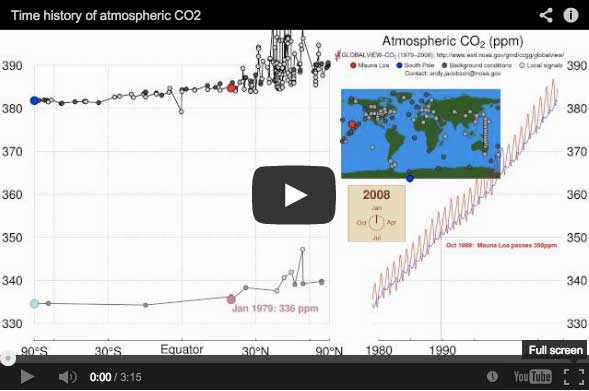Here is another short and descriptive video about ocean acidification.
/Martin Hedberg
Tag - video
A long, but equally informative, video where Naomi Oreskes describes the history of climate science and the industry of denialism.
This is a presentation from march 2010 based off of Oreskes book, “Merchants of Doubt: How a Handful of Scientists Obscure the Truth about Climate Change”.
/Martin Hedberg
A short video about the basics of ocean acidification.
/Martin Hedberg
James Hansen interviewed by The Economist.
Interesting conclusion that the Conservatives should be the ones in the fore-front of mitigating climate change. Because if humanity don’t act soon, the government will have to take over more of our lives. Governments are the only ones strong enough to deal with all the problems we are facing if we don’t mitigate climate change -and that for sure is something the Conservatives don’t like.
/Martin Hedberg
Super storm Sandy forces insurer to rethink risk. Climate change is the new normal.
But the insurance industry looks at historical data, old and new, in order to assess the risk for potential disasters and put a price on premiums. When climate is changing, the old data is… -old.
And that turmes the analys from that data into something that does not represent reality. This has implications for risk, economy and ultimately well fare and lives.
As the insurance industry realizes the new risks and probable events, the public may find it hard to accept this new pricing of risk. It is therefore in both the public, governmental and insurance industries interests that everybody stays well informed about what is known and understood from a scientific perspective about climate change and future possible events.
Interesting video on risk and resilience. As the author says “Moving from a system designed for robustness to one that supports resilience represents a significant strategic shift.”
Dealing with black swans, moving from a Gaussian world to a Pareto world. Moving from probable events via possible to plausible events.
/Martin Hedberg
Michael Mann från Penn State University om att vi är mycket nära katastrofala gränser i klimatsystemet. För att uppnå 2-graders målet så måste vi snarast minska utsläppen av koldioxid.
Men det är inte som att falla över en klippkant, det är snarare ett allt mer sluttande plan. Men vi närmar oss många problem, tex kan vi snart komma att se accelererade utsläpp av metan från naturen själv. Detta som en konsekvens av den uppvärmning som skett till följd av våra utsläpp.
Osäkerheter i kunskaper har hittills resulterat i att vi hållit fast vid “business as usual”. Det borde istället vara tvärtom: Osäkerheter borde göra oss mer försiktiga.
Man beskriver en del av sakerna han tar upp i sin bok “The hockey stick and the climate wars”. Vi kommer, med nuvarande hastighet på utsläpp, att passera kritiska gränsvärden innan år 2036. Det är 22 år från och med idag.
/Martin Hedberg
Bill gates is mostly known for two things: Microsoft and funding of health care.
Here, on this TED-talk, he takes on the great task och climate change and energy.
/Martin Hedberg
This is a beautiful story about the complex world of creativity, incentives and motivation. It is also an example of Graphic Recording/Graphic facilitation.
Title: “RSA Animate – Drive: The surprising truth about what motivates us”
This is a really nice way of illustrating the level of carbon dioxide over the the past 800.000 years. Something very unusual, however not unexpected, is happening right now.
From NOAA Carbon Tracker at YouTube.
